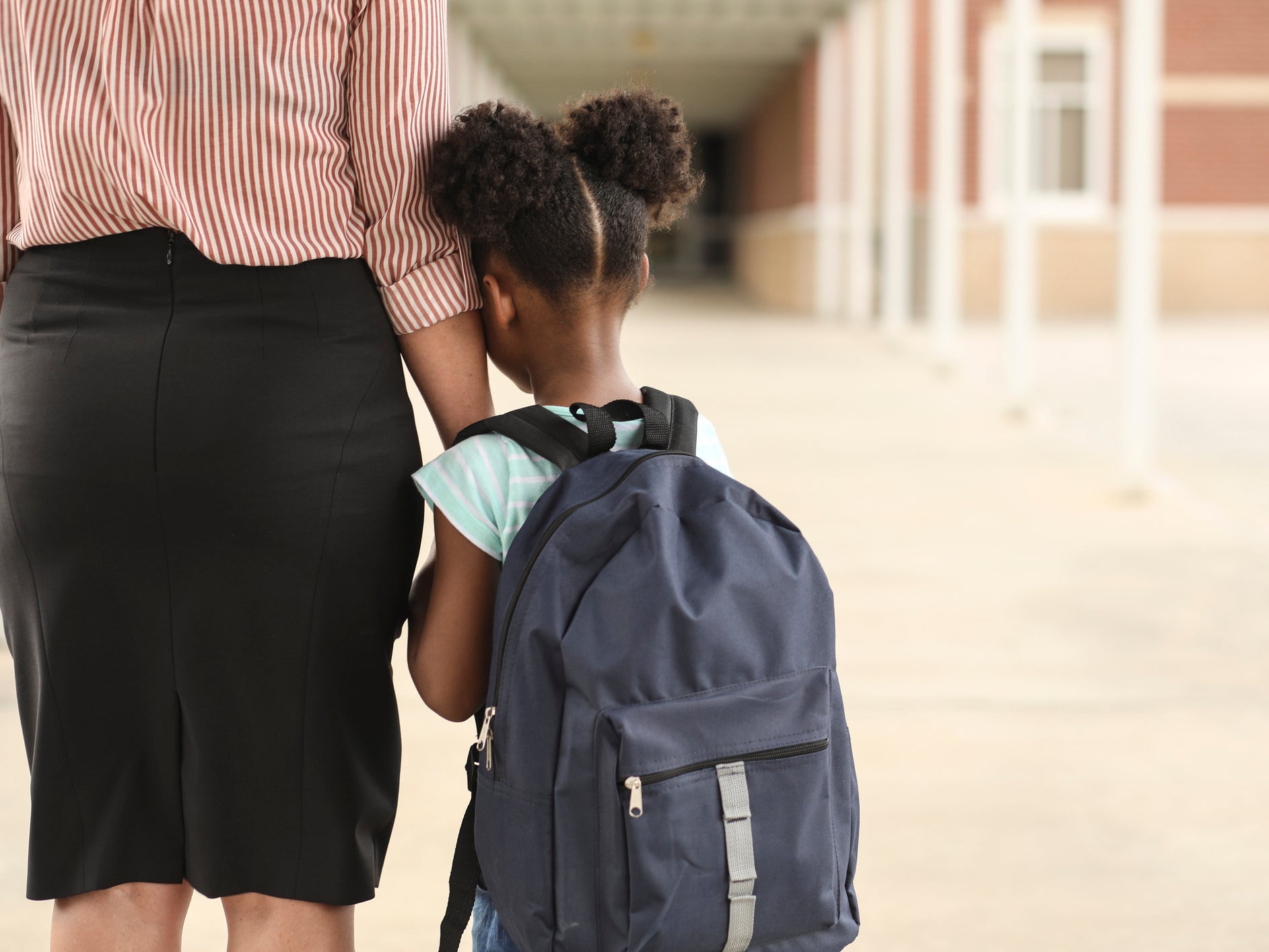‘There are things they’re missing that they can't get from us’: Parents weigh up the benefits and risks of sending their children back to school
As schools in England reopen fully for the first time since March, Natasha Preskey speaks to parents about their concerns


Your support helps us to tell the story
From reproductive rights to climate change to Big Tech, The Independent is on the ground when the story is developing. Whether it's investigating the financials of Elon Musk's pro-Trump PAC or producing our latest documentary, 'The A Word', which shines a light on the American women fighting for reproductive rights, we know how important it is to parse out the facts from the messaging.
At such a critical moment in US history, we need reporters on the ground. Your donation allows us to keep sending journalists to speak to both sides of the story.
The Independent is trusted by Americans across the entire political spectrum. And unlike many other quality news outlets, we choose not to lock Americans out of our reporting and analysis with paywalls. We believe quality journalism should be available to everyone, paid for by those who can afford it.
Your support makes all the difference.During lockdown, Amy Williams had to stop her son from switching on the news. “He went through a bit of an obsession,” she tells The Independent. “He kept thinking that if he listened to the news then he’d find out it was over.”
Her six-year-old has been off school since March and Amy’s other son, who is two years younger, has been away from nursery and is due to start school today. “They need to be with their friends,” she says. “I think we forget kids are humans and they have the same needs that we do – which include social interaction that isn’t just with your brother or your mum.”
Schools have been closed since Friday 20th March, three days before the country went into full lockdown and two weeks before the Easter holidays were due to begin. Vulnerable children and the kids of key workers were allowed to continue attending but they had to do so under strict social-distancing measures.
During lockdown, there was constant uncertainty around whether schools would return before the summer holidays, with reports of a continual back and forth between SAGE, the government and the teaching unions. From June 1, some primary schools and nurseries reopened in England for nursery year, reception and years one and six, while secondary schools opened to years 10 and 12 from June 15.
Amy didn’t feel confident sending her sons back to school and nursery in June. “I was a bit like ‘You’re telling me that I can’t go out anywhere, but they can go into school?’ I don’t really like that,” the 24-year-old from North Wales tells The Independent. But she now feels that she and the boys are ready for them to return this week. “I’m trying to focus on the positives of them going back, which is how it’s going to impact their wellbeing.”
Wellbeing has also been a primary concern for 27-year-old Yasmin, whose eight-year-old son returns to school this week. The mother-of-one, who lives in the East Midlands, has spoken about her concerns around the return to school with friends and with her therapist. “I think, having weighed the pros and cons, it’s going to be far more beneficial for him to go and to be able to socialise,” she says. “He hasn’t seen his friends since March. He hasn’t had anyone to play with his own age.”
It seems pretty inconclusive about the risk that children pose as vectors of the disease for other people
Yasmin says her son has been able to talk to family via FaceTime and that they celebrated his birthday in lockdown, but that nothing can replace contact with other kids. “There are things that they’re missing that they can’t get from us,” she explains. “They need the silliness and the jokes, the games and the quarrels. I think it’s better for him to go back and, if necessary, if I don’t feel that the school is distancing properly, I could always remove him, and home school him.”
At the London secondary state school where Sophia* teaches, many kids live in multigenerational households, and parents have concerns about their children infecting older family members. Sophia says for caregivers whose jobs involve shift work, having their teenage children at home has also been a lifeline in helping them care for younger children.
In terms of hygiene measures, the 27-year-old tells The Independent that the new restrictions in her school are likely to be short-lived.
The government states that the “catch it, bin it, kill it” approach will continue to be important in schools, with academic institutions being made to “ensure that they have enough tissues and bins available in the school to support pupils and staff to follow this routine”. Equipment that is shared in lessons must be cleaned on a regular basis, while tables are to be cleaned in between groups of students at lunch time.
Students in Year 6 and below will not have to wear face coverings at school, while students in Year 7 and above may have to “in areas outside the classroom where social distancing cannot easily be maintained”, a decision that will be up to their schools. Meanwhile, the size of student “bubbles” may increase to include an entire year group of pupils, a measure that was initially introduced for younger students less capable of social distancing than their older peers.
“There won’t be money for that many table wipes, and I think sanitiser will run out,” Sophia says. “In reality, I think it will be very much like going back to school before coronavirus.”
School is one of the things where the benefits outweigh the risks
“There will be good intentions on the part of the school,” she continues. “But you cannot manage 500 children every single moment of every day and even if, by some miracle, we could manage to keep them relatively spread out within school, the second that students go back through the school gates, I can guarantee you they’re going to be hugging, touching and playing football.”
Despite the risks involved, Sophia says the school is a vital refuge for some students, especially those from lower income backgrounds, many of whom normally only eat a meal when they’re at school. During lockdown, teachers at her school distributed food parcels, lent students laptops and helped them gain access to the internet. “We had a GoFundMe that teachers donated to,” she says. “The school reallocated their budget to spend what they could, but the reality was there just wasn’t the money.”
Zack, 28, is sending his son back to primary school this week but his wife is due to have their second child in three weeks’ time. “If he does bring it back from school and she catches it, it’s not a good time for that to happen,” he says. “I don’t think my eight-year-old is going to be at any great risk of it but it seems pretty inconclusive about the risk that children pose as vectors of the disease for other people.”
Clare and Jane Billings-Deed and their 17-year-old daughter Ellie, from Ipswich, say they’ve found the government guidance around the return to schools – including advice around mask-wearing – inconsistent and confusing. However, they’re glad Ellie can return to study for her final year in person. “It’s been awful for the year 13s but the year 12s will miss out on quite a lot of those milestone experiences too, like going to university open days,” says Clare, 53.
Ellie’s year group returned to school for a day on-site at the end of last term. “All the chairs were spaced out well, and they had us go into the bathroom one at a time to make sure our hands were really clean,” she says, adding that she’s “really excited” to return full-time.
Despite his worries about the virus, Zack is happy that his son is able to go back this week. “There’s always that element of risk to it but I think that school is one of the things where the benefits outweigh the risks a lot,” he says. “Keeping the schools open should be a higher priority than having pubs and shops open.”
Join our commenting forum
Join thought-provoking conversations, follow other Independent readers and see their replies
Comments